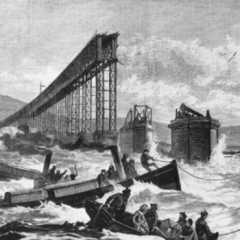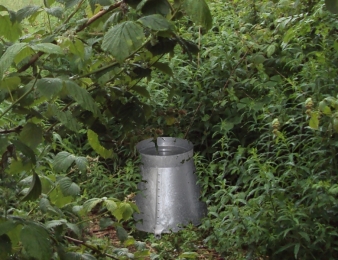By Gubby Plenderleith.
I had arrived early and not a little nervous at Dundee’s Trocadero Restaurant to interview a man who has been a Scottish legend for over sixty years. My anxiety however, owed more to his reputation as a hell-raiser and the countless stories of his encounters with fellow journalists, in which the denizens of the fourth estate had unfailingly come off second best, than to his celebrity status.
I also expected – and secretly hoped – that, again in line with his notoriety, he would fail to show, or at least arrive so late (and so inebriated) that any interview with him would be impossible and I could escape the feared ordeal while still retaining a degree of credibility.
It was not to be. At exactly one o’clock (as arranged) a rather distinguished silver haired man, wearing a black Armani suit and a pearl grey collarless shirt, entered the restaurant and almost glided up to my table.
A warm smile spread across his tanned face as he held out a friendly hand in greeting. “William McCallum,” he said in a soft, transatlantic voice, “Pleased to meet you. Please, call me Bill”.
As I took the extended hand, I found it hard to believe that I was face to face with the famed “Oor Wullie” of my Sunday morning childhood and, more to the point, that I was here to interview and have lunch with him. “They tell me the langoustine are excellent here”, he almost whispers. “I’m almost vegetarian these days – certainly no red meat, but I still eat the occasional chicken and I absolutely adore fish”.
Suddenly my previous apprehension has disappeared and I’m unexpectedly enjoying the experience of sitting in one of the swankiest eateries this side of Watford Gap with the most famous man in Scotland. “Don’t be frightened to ask me anything you want”, he invites, “I’ve learned to confront my past and nothing can hurt me any more. The way I see it”, he says, taking a sip of Pellegrino, “what was happening back then was happening to Wullie, not to Bill McCallum. All these stories about my debauched lifestyle that was just …”, he looks away for a moment, searching for the right word, “… mince!”
“But,” I ask him, “What of those stories about him and Primrose, how they were reputed to be caught up in the drug scene, consorting with underworld gang bosses and throwing wild orgies in his baronial castle on Tayside”.
“Ah, Primrose”, he whispers wistfully, “we’re still very close. I’m godfather to her youngest boy and often visit she and her husband at their home in Luss”.
“But… the parties and the gangland connections – put it down to being a daft boy. I was a daft boy, after all. I mean, I came from a working class background and was suddenly catapulted into the limelight at the age of nine – what kind of chance did I have? In some ways, it was my own personal zeitgeist, if that doesn’t sound too much like some sort of aphorism”.
“But don’t get me wrong”, he smiles, “I’m not trying to make excuses. Sure, with a bit of discipline, I could have avoided all of that. But I didn’t have the education and my mother and father didn’t have the education, or the experience of money either, to keep me on the straight and narrow”.
“Still”, he says, “things didn’t work out too bad in the end. I bought my parents a place in Millport where they saw out their years and I’ve got myself a fairly decent place in Provence….And all these stories. Well”, he smiles, “a lot of these were made up by the press, especially the paper I used to work for”, he winks, “But I’m not allowed to mention the name of that – it was part of the court settlement”. I nod.
“What about Eck, Boab and Soapy, I ask. “and PC Murdoch”?
“Murdoch!” he laughs, “I could tell you a few tales about him, all right! I hope you were never taken in by his avuncular – what’s the word we used to use? – couthiness! Bent as a bloody trombone that one. It was his partner Trevor I used to feel sorry for. Old Trev would sit up waiting for him ’til the early hours while the bold boy was out trawling round the gay bars, picking up every bit of rough that took his fancy. I used to tell him that he was being unfair to Trevor, but he just used to laugh. ‘Ooh, you’re so masterful when you’re angry, dear heart’ he used to say.
“At least old Trev did all right when Murdoch passed on. Left him everything in his will and he bought a nice little bungalow out at Brought Ferry. Lives there with his cats. I still visit him occasionally when I’m in the country”.
“But the others”, I remind him, “Boab and Soapy and …”
“Sure”, he says, “I still see them from time to time although, admittedly, not so much now. You wouldn’t recognise Boab these days”, he sighs, “He’s almost anorexic, went on some fancy diet and the pounds just dropped off. Doing well for himself too. Has his own business, a big house and nine grandchildren.
“Wee Eck’s another story altogether”, a pained expression appears on his face, “he was the unlucky one. I managed to kick the drugs and the booze, but Eck…”, he shakes his head.
“..and what about Soapy?”, I ask.
He brightens, “Ah Soapy, he was the luckiest of them all. Stayed on at school, went on to university, then changed his name and went into politics. Did very well too”.
I ask him what Soapy’s name is now.
“Ah“, he says, tapping the side of his nose knowingly, “that would be telling. Let’s just say he‘s working in Edinburgh now and you‘d know his name if I told you”.
“So everything worked out OK in the end?”, I ask.
“Oh, yes, everything worked out in the end”, he says.
As I slip the car into gear and start to head out of Dundee on my journey home, I suddenly realise that I’ve just been in the company of one of Scotland’s national treasures and not only have I survived it but I’ve enjoyed every minute and found it a strangely humbling experience.

